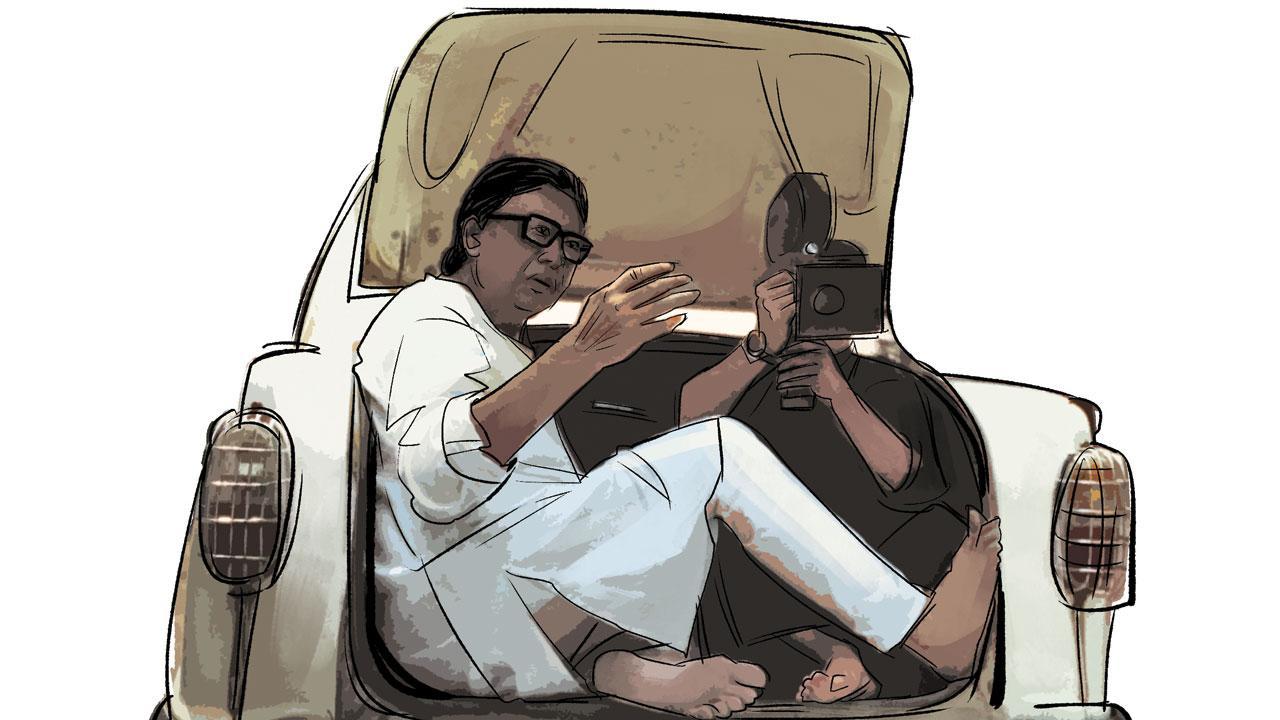This is a coming of age film, but not typically of an adolescent

Illustration/Uday Mohite
![]() Anjan Dutt’s Chalchitra Ekhon (Kaleidoscope Now, Bengali with English subtitles) is a moving film that drops on SVF’s streamer Hoichoi on May 10. This partly autobiographical, fictionalised film is a tribute by popular actor, composer, singer and filmmaker Anjan Dutt to his mentor, the late distinguished filmmaker Mrinal Sen (1923-2018). It references Mrinal Sen’s Chaalchitra (Kaleidoscope, 1981), in which the senior director gave a young Anjan Dutt, 26, his first break as an actor, that deeply influenced him and his career, and led to a lifelong friendship. The 2023 film is a living connection to our contemporary film history, made in Sen’s centenary year (2023-2024), and one of three feature film tributes to Sen by popular filmmakers, along with Srijit Mukherji’s Padatik and Kaushik Ganguly’s Palan. Satyajit Ray, Mrinal Sen and Ritwik Ghatak are Bengal’s holy Trinity, and Ray’s towering presence has often overshadowed the work of Sen and Ghatak; all the more creditable that Sen is being tributed thus.
Anjan Dutt’s Chalchitra Ekhon (Kaleidoscope Now, Bengali with English subtitles) is a moving film that drops on SVF’s streamer Hoichoi on May 10. This partly autobiographical, fictionalised film is a tribute by popular actor, composer, singer and filmmaker Anjan Dutt to his mentor, the late distinguished filmmaker Mrinal Sen (1923-2018). It references Mrinal Sen’s Chaalchitra (Kaleidoscope, 1981), in which the senior director gave a young Anjan Dutt, 26, his first break as an actor, that deeply influenced him and his career, and led to a lifelong friendship. The 2023 film is a living connection to our contemporary film history, made in Sen’s centenary year (2023-2024), and one of three feature film tributes to Sen by popular filmmakers, along with Srijit Mukherji’s Padatik and Kaushik Ganguly’s Palan. Satyajit Ray, Mrinal Sen and Ritwik Ghatak are Bengal’s holy Trinity, and Ray’s towering presence has often overshadowed the work of Sen and Ghatak; all the more creditable that Sen is being tributed thus.
ADVERTISEMENT
Chalchitra Ekhon was shown at the Kolkata and Dhaka International Film Festivals (where Anjan Dutt won the Best Actor Award), and it also reflects the tragic state of indie cinema that it’s getting a theatrical release only in select Kolkata theatres, and is also out on OTT, the same day. Anjan Dutt, who has directed about 30 films and series, including Bow Barracks and The Bong Connection, and acted in about 55 films, is also a popular composer-singer, of course. He had won Best Debutant Actor for Chaalchitra at the Venice Film Festival in 1981, but the producer went bankrupt right then, so the film was never theatrically released as such, but shown at Nandan during the centenary in 2023 and on Doordarshan.
This is a coming of age film, but not typically of an adolescent. It is rather the political coming of age of a young, married man, who acts in theatre and film, and is troubled about his own political beliefs, whether he is Communist or not, what the city of Calcutta means to him, whether he sees a future for himself in it—and how Mrinal Sen guides him, giving his life a new meaning in the course of making the film. Also, only a Bengali (and possibly Malayalam) film today would even openly discuss—and rationally attack—urban communism: otherwise, you’re instant troll army fodder. (Remember the job interview scene in Satyajit Ray’s Pratidwandi, 1970, when Dhritiman Chatterjee is asked, “Are you a Communist?”—that prickly question has a long history).
Anjan Dutt’s direction, even though somewhat uneven, makes for a keenly felt film, because it centres on his personal relationship with Sen as a mentor on his first film, rather than documenting Sen’s larger oeuvre. It is a film a clef, with stand-in names for well-known personalities: Anjan Dutt himself plays Mrinal Sen (here called Kunal Sen), while young actor Sawon Chakraborty plays a young Anjan Dutt (here Ranjan Dutt), Sen’s actress-wife Gita Sen is Mita Sen and cult cinematographer KK Mahajan is JK. Ranjan Dutt is troubled by indecision—about his politics, what Kolkata means to him and where he sees his future. Passionate about intellectual theatre, he’s keen to migrate to Germany, but in the course of the film, he understands his own privilege even as a middle-class man, and that even artistic, independent filmmaking is an economic activity, feeding middle class families. And naturally, given Anjan and Neel Dutt’s musical gifts, the film is punctuated by their superb songs about Kolkata. As an actor, Anjan Dutt is in command, superbly capturing Sen’s essence, small moments and gestures, without needing to mimic the great director. Sawon Chakraborty, a mop-haired scowler, plays Ranjan Dutt’s dilemmas with nervous intensity, sometimes overdoing it, and frequently talking to camera. Anjan Dutt’s screenplay covers significant ground—the dilemmas of art and politics, and also the economic situation in Kolkata, as lower middle-class families can afford only coal stoves for cooking, not gas cylinders (referencing Sen’s Chaalchitra, see YouTube), and what Kolkata means to both of them. Bidipta Chakraborty is marvellous as Sen’s wife even in a small role, suggesting a stoic resilience and commitment to family above all, where both men appear to fall short in comparison. Pravatendu Mondal’s cinematography and Arghyakamal Mitra’s editing are effective. The film is produced by Anjan Dutt and Neel Dutt, and the women’s crew include stylist Chanda Dutt. Do watch this film.
Meenakshi Shedde is India and South Asia Delegate to the Berlin International Film Festival, National Award-winning critic, curator to festivals worldwide and journalist.
Reach her at meenakshi.shedde@mid-day.com
 Subscribe today by clicking the link and stay updated with the latest news!" Click here!
Subscribe today by clicking the link and stay updated with the latest news!" Click here!







